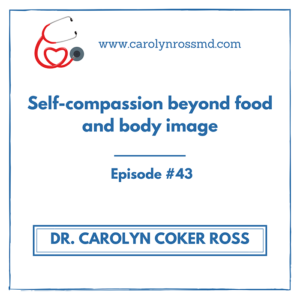On today’s episode I will discuss:
1. What is self-compassion?
2. Why is self-compassion so important?
3. How can you develop self-compassion?
HOMEWORK:
List 2 ways in which you can treat yourself with more compassion. Many people who have trouble feeling self-compassion, can imagine being compassionate towards a small child or a pet. So think of how you can give yourself the same care you would give to a small child or pet.
EPISODE #43 SELF COMPASSION BEYOND FOOD AND BODY IMAGE OR
How to stop trying to hate yourself thin
Many people with binge eating disorder, emotional eating or food addiction don’t consciously feel they are trying to hate themselves thin, but their food obsession alternating with deprivation, obsessive weighing, compulsive exercise and negative body talk and scale talk are all examples of this.
This desire to hate yourself thin comes from the (unconscious) belief that if I’m hard on myself, I can keep myself from getting fat. And if you’re even harder on yourself, you will “shape up” and learn how to eat better and take better care of your body. If you can recognize that you’ve been in this mindset of “hate yourself thin,” ask yourself “how is that working?”
Being nice to yourself, particularly during a personal setback or a stressful experience, is known as self-compassion.
If you can see yourself in a new light, as someone going through a process, and if you can see that all the challenges and what you may have called failures along the way are just part of that journey, it may help you recognize that what’s ahead on your journey is up to you and is all part of your process. This may give you the motivation to keep going, knowing there is a gift you will return with (besides just a healthy body). The gift could be one of more self-love or compassion, or it could spark a change in your career or improve your relationships.
Just as romantic and friendship relationships are affected by the early relationship with your primary caregiver, your relationship with your body is also affected. People who didn’t receive nurturing as an infant may not be able to nurture themselves as adults. If you tend not to trust others, you may view your body with mistrust.
For example, when you sense a body sensation related to an emotion or just a simple body cue of hunger, you may second- guess that message from your body. If you have difficulty connecting emotionally with others, you may also have trouble feeling a sense of compassion or connection to your body. What’s important is to identify ways in which your early attachment relationships have affected your relationship with your body and ways to make needed changes.
Studies show that if you respond to life’s difficulties with self-compassion, this can reduce depression, stress, performance anxiety and body dissatisfaction, increasing happiness, self-confidence and immune function.
The most important person to have compassion for is yourself.
The deepest healing is awakening to who you truly are—seeing yourself, your flaws, and your mistakes with compassion. When this happens, you will find yourself moving beyond just the focus on behaviors (binging, emotional eating, etc.). Over the time, as you come to know yourself, stop judging your past, and accept your character flaws, you will feel more compassion toward other people as well.
Many people who are in recovery from addictions stay at the superficial level, as in not drinking or not bingeing. REFER TO FREE E-BOOK While abstinence from behaviors is very important, it should be seen as the gateway for a deeper understanding of yourself and your addiction—not an end result. Deepening your recovery by awakening your spiritual connection or by nourishing your spirit or practicing self-compassion brings with it more security in your recovery and a deeper sense of peace and joy in your life. As you connect with something greater than yourself (nature, God, awe, love), you will find yourself less focused on how you look and on the desire to binge or overeat. This connection could come through relationships and social support, but it should be something you can generate internally by finding activities and daily practices that foster this experience. Recovery cannot be based on the willpower that many people use to stop their behaviors. This is a shaky foundation. You build a stronger foundation when you go deeper into yourself, This is in fact what research shows. Awakening to knowing your true self is associated with lower rates of substance-seeking behaviors (Galanter et al. 2013). This means that self-compassion is not for some abstract purpose, but actually can help your brain recover and lower your risk for relapsing. There are many ways to satisfy your soul’s yearnings for fulfillment, connection, and a sense of meaning in life.
3 Ways Compassion Happens:
- First you must notice your own suffering. Admit the pain you feel from your binge eating, compulsive overeating, emotional eating or food addiction.
- Open your heart to accept and notice the suffering your eating behaviors have caused.
- The Buddhists say: “Pain is part of the human condition.” This means none of us are perfect AND all of us deserve compassion and understanding.
Anchor Program starting soon!
To learn more, sign up for a FREE consult here: https://findingyouranchor.as.me/consult









